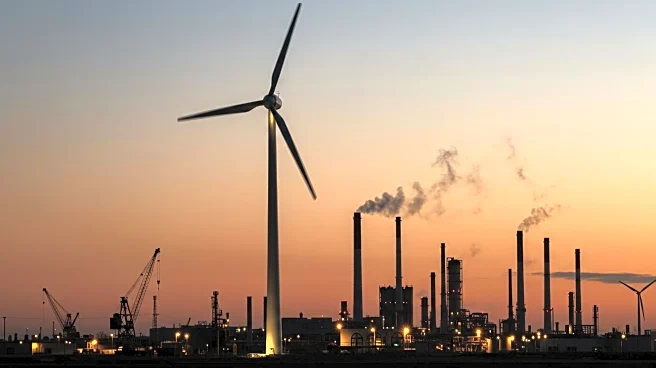What's Happening?
South Korea is grappling with a structural dependence on heavy industry, which complicates its transition away from fossil fuels. Despite pledges to reach carbon neutrality by 2050, the country's energy mix remains dominated by coal and nuclear power. The Korea Electric Power Corporation (Kepco), a state-owned monopoly, controls much of the energy sector, creating barriers for renewable energy developers. Recent legislative efforts aim to streamline approvals for renewable projects, but significant challenges remain, including grid expansion and local opposition. Political volatility further complicates long-term planning, with policy reversals affecting nuclear and renewable energy strategies.
Why It's Important?
The situation in South Korea highlights the difficulties faced by countries with entrenched energy models in transitioning to cleaner energy sources. The reliance on fossil fuels and nuclear power poses challenges to achieving climate goals, impacting global efforts to combat climate change. The influence of powerful conglomerates and the state monopoly on energy further complicates the shift towards renewables. This has implications for international climate agreements and the global energy market, as South Korea continues to finance fossil fuel projects abroad, contradicting its domestic climate targets.
What's Next?
South Korea's energy strategy is guided by a 15-year forecast, but the framework remains outdated, prioritizing centralized power generation. The passage of new legislation aimed at expanding the power grid and streamlining renewable energy approvals is a step forward, but implementation will take time. The government faces pressure to reconcile its climate commitments with economic interests, particularly from heavy industries. Future policy changes and international collaborations may influence the country's energy transition, but significant reform is needed to overcome existing barriers.
Beyond the Headlines
The entrenched energy model in South Korea reflects broader global challenges in transitioning to renewable energy. The influence of industrial conglomerates and the state monopoly on energy policy highlights the need for structural reform. The ongoing legal actions by citizens and activists against fossil fuel projects indicate growing public awareness and demand for change. These efforts may inspire similar movements in other countries, emphasizing the role of civil society in driving climate action.








